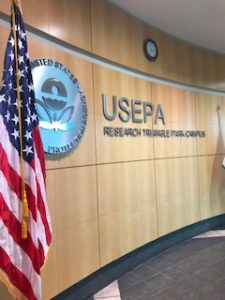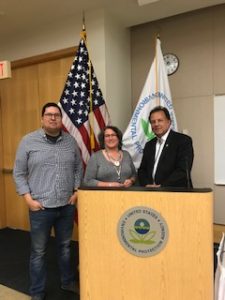Week 3 at the EPA: A Seat at the Table

In the MPA program, we learn a great deal about the importance of stakeholders and bringing various voices to the table to help in the decision making process. We as public servants should be cognizant of the individuals we are serving and should listen and value their ideas. Since environmental issues touch every person in every sector, the EPA serves a multitude of stakeholders, including states, tribes, local governments, industry representatives, environmental groups, and more. Subsequently, the Agency works hard to bring all of these voices to the table in the development of environmental policy and regulation.
These efforts were discussed at length during the “Working Effectively with Tribal Governments” workshop I attended this week. American Indian tribes are unique in that they are recognized as sovereign governments. Currently, there are 537 sovereign tribal nations recognized in the United States. Each of these tribes exerts self-governance and are included in the broader community of American Indians and reservation lands defined in the United States Code as “Indian Country.”
The EPA was one of the first federal agencies to develop a formalized policy for interacting with tribal governments and considering tribal interests in carrying out its programs to protect human health and the environment. The EPA Policy for the Administration of Environmental Programs on Indian Reservations, known simply as the “1984 Indian Policy,” formally brought tribal governments to the decision making table.

From left to right: Vallen Cook, Laura McKelvey, and Greogry Richardson
The workshop discussed the historical relationship between the United States and tribal governments as well as tribal jurisdiction, authority, and environmental programs. Presenters included environmental experts with American Indian heritage. Vallen Cook is an Air Quality Specialist in the Grand Portage Band of Lake Superior Chippewa. Laura McKelvey is manager of the Community and Tribal Programs Group in the Office of Air Quality Planning and Standards at the EPA. Greogry Richardson is Executive Director of the NC Commission of Indian Affairs.
One of the most interesting aspects of the workshop was the discussion on respecting tribal traditions, culture, and sovereignty. The EPA recognizes the contentious past between the US government and American Indians, and strives towards continuing to improve this relationship. Understanding and respecting tribal culture and identity is a key component of fostering trustworthy relationships with tribal governments so that their environmental interests and needs are recognized and addressed. Community members like Vallen, Laura, and Gregory advocate for American Indian interests and educate federal employees on how to work effectively with tribal governments. The first step is to offer them a seat at the table.
Thanks for reading!
Sydney
